Anxiety disorders are believed to affect 40 million people in the United States alone, every year.
However, these statistics only concern medical anxiety disorders like GAD, suggesting that the number of people affected by milder stress and anxiety might be much bigger. We have all experienced feelings of worry and debilitating stress at some point in our lives, but if these symptoms persist, the best course of action is to tackle the problem early before it snowballs even further.
The global interest in natural, side-effect-free remedies to reduce stress and manage anxiety levels is growing, and finding natural stress-relievers has never been easier than in 2022.
Here are some of our top picks for the best supplements and vitamins for anxiety, carefully selected to show what's been backed by the latest science.
Editors' Pick: What is the best natural supplement for anxiety & stress?
 We believe the best natural supplement for anxiety is our Future Kind Super Vegan Anxiety & Stress Supplement, which contains 200mg of Ashwagandha, 200mg of Rhodiola extract, and 200mg of organic lemon balm.
We believe the best natural supplement for anxiety is our Future Kind Super Vegan Anxiety & Stress Supplement, which contains 200mg of Ashwagandha, 200mg of Rhodiola extract, and 200mg of organic lemon balm.
Pros
- This product is a powerful natural blend of the most extensively researched herbs in clinical studies: ashwagandha, rhodiola, and lemon balm.
- Studies suggest that these herbs can ease symptoms of anxiety and help relieve stress without any side effects.
- This supplement is suitable for vegans and non-vegans alike and free from all allergens.
Cons
- At a $30 price point for 30 capsules, this anxiety-relief supplement is not the most accessible on the market. Though you get what you pay for. The high-quality ingredients and the strong scientific background at the forefront of the ingredients' selection make it all worth it!
Buyer's Guide - What to look for in vitamins for anxiety and supplements
When picking an efficient and natural supplement for anxiety, knowing what ingredients have scientifically been shown to help reduce symptoms in a clinical setting should be your first step.
Whatever route you decide to take, it's important to keep an eye out for unfounded claims or pseudoscientific attitudes that won't help your anxiety in the long term!
Controversial Ingredients
Most products on the market will contain herbal supplements used for centuries in Ayurvedic medicine or, alternatively, mainstream vitamins that have been shown to help ease anxiety and its associated symptoms. Some herbal ingredients and vitamins, however, lack the necessary research to be backed by science as safe and effective supplements to reduce anxiety.
Licorice root
Licorice has been used as a medicinal plant for hundreds of years, and it is most well-known for its anti-inflammatory properties and its ability to lower high blood pressure. Licorice root has long been marketed as a natural supplement for combating anxiety, but there isn't enough research to support these claims.
Vitamin B complex
Vitamins like the vitamin B complex have also been suggested to help lower anxiety levels, but there isn't enough research to sustain these claims either, as only a handful of B vitamins (primarily B12) have been associated with anxiolytic effects.
The evidence on these effects, however, is still quite scarce compared to more extensively studied herbs and vitamins. One study suggests a correlation between low B12 levels and an occurrence of anxiety and depression, while another found improvements in stress levels in participants consuming B12-rich yeast spreads regularly.
Vitamin D
The effects of vitamin D on anxiety and mental health are also controversial: links have been established between vitamin D intake and depression, suggesting that a deficiency in the vitamin may increase the risk of developing mood disorders.
When it comes to anxiety, however, the link is much weaker. The most well-known studies on the topic have put anxiety and depression in the same category due to comorbidity. Stress and occasional anxiety are in a league of their own, and we are lacking enough research to establish a true correlation between vitamin D intake and stress relief.
GABA
Understanding the function of the amino acid GABA is key to identify what supplements or type of adaptogenic herb will likely help with anxiety and stress.
GABA, which stands for much less catchy gamma-aminobutyric acid, is a naturally occurring amino acid that can inhibit certain brain signals from being transmitted throughout your body, impacting your nervous system and reducing symptoms of anxiety by targeting active brain receptors.
In recent years, the chemical has increasingly been used as a supplement in tea products, but its effectiveness is still a point of contention among experts due to insufficient research. Studies suggest that only a very small amount of supplemented GABA actually reaches the brain, and earlier studies identifying a positive link between the chemical and induced relaxation have been based on a very small pool of participants - in short, the results are promising but far from being convincing.
Best Herbal Supplements For Anxiety
So, what herbal supplements are actually backed by science? Here are the top 5 ingredients you are likely to get mental health benefits from.
Valerian Root
Valerian root is one of the most popular herbal supplements for managing anxiety symptoms and improve sleep quality, and it works by altering the functional brain connectivity that relates to anxiety.
Although its effectiveness as a sleep aid has been put into question by meta-analyses due to the inconsistency of quality and the unstable nature of its active constituents, it is mostly considered safe and effective as a natural stress-relief.
Ashwagandha
Ashwagandha root is a powerful adaptogen that's long been used in Ayurvedic medicine to promote relaxation and ease anxiety symptoms.
On top of providing anxiolytic effects, the herb has been shown to improve energy levels and mitochondrial health, boasting anti-inflammatory and anti-arthritic agents that may help those with chronic inflammatory disorders manage their symptoms better.
Rhodiola (Golden Root)
Rhodiola has been extensively studied for its anti-fatigue properties, playing a significant role in energy, endurance, and recovery on top of its ability to improve mood and help manage stress.
One of the most surprising features of this herb is how it can help target feelings of "burnout", the mental and physical exhaustion induced by chronic levels of stress.
Lemon Balm
This is another popular herb that's traditionally been used to target feelings of anxiety and depression, suggested to naturally affect cognitive function and mood.
Research is still undergoing to determine the potential anti-cancer properties of this herbal supplement, but its efficacy in mitigating stress is hard to ignore.
Best Non-Herbal Supplements and Vitamins For Anxiety
Although not all vitamins marketed as anti-anxiety can give satisfying results, a small number of popular minerals and compounds can help ease symptoms.
Here are the 3 ingredients that have been found the most beneficial.
Magnesium
Magnesium is perhaps the most extensively studied minerals in relation to anxiety and mental health. Supplementation has been shown to help ease feelings of anxiety and subjective stress, and the mineral has been put forward as a promising new treatment for mild subjective anxiety.
Make sure you're not supplementing more than the 400/300mg daily you need, however: excessive intake may lead to unpleasant gastrointestinal issues!
L-theanine
L-theanine is an amino acid most commonly found in green tea and black tea.
According to a 2018 study on rats, the amino acid might help combat stress by affective cognitive function and mood. Subsequent research has confirmed these findings, identifying this compound as an efficient booster to mental health, able to ease associated anxiety symptoms.
Omega-3 fatty acids
Omega-3 fatty acids have also been shown to help manage occasional anxiety and anxiety disorders.
A 2018 systematic review has found a beneficial link between omega-3 intake and clinical anxiety, going so far as to say that omega-3 supplementation may help those with an anxiety disorder even better than those suffering from occasional, subjective anxiety.
Top 5 Supplements for Stress and Anxiety
Now that you know what ingredients have been backed by science and what have not reached that stage just yet, let's take a look at the best products available on the market to ease anxious minds.
These top picks have been selected to only include the most extensively researched anxiolytic ingredients and only products rated above four stars on Amazon, so you can be sure you'll get your money's worth!
Nature's Bounty Ashwagandha KSM-66
Pros
Nature's Bounty supplement contains 50 tablets and it's priced at $9.98, making it one of the most convenient choices for easing anxiety and stress. The blend contains 200mg of L-theanine and 600mg of ashwagandha root.
Cons
These supplements are not suitable for vegans or those with a dairy allergy and contain unnecessary bulking ingredients in their formula.
Triple Calm Magnesium
Pros
The formula features 150mg of magnesium and contains 60 servings per bottle. Featuring three forms of magnesium (taurate, glycinate, and malate), this product is a great option for tackling anxiety and promoting better sleep.
Cons
Priced at $21.10 per bottle, this product might not be the most accessible option for some. Its formula is fully centered around magnesium, lacking other helpful herbal supplements that come with no side effects.
Procera Mood
Pros
The product's formula contains Rhodiola and ashwagandha, two of the most extensively studied supplements for managing anxiety. It also contains L-theanine and magnesium, making for an efficient blend of nutrients.
Cons
At $29.95, this product is not the most accessible. The formula also contains vitamins that some might want to avoid if they're already getting enough from their diet or daily multivitamin, like vitamin C, zinc, and B12.
NOW True Calm
Pros
Priced at $11.99, this product is a convenient option for getting anxiety-reducing valerian root, magnesium, and GABA. Although it contains taurine, it is suitable for vegans and vegetarians.
Cons
The product's formula lacks many other herbal supplements and vitamins that can help reduce anxiety and features a whopping 45mg of niacin which some users may want to avoid.
Garden of Life Mood+
Pros
Featuring 16 probiotic strains that promote digestive balance, this product is a great option if you want to tackle your digestive health alongside your brain health. The formula contains organic ashwagandha mixed with a blend of berries suggested to help mitigate stress naturally.
Cons
As a probiotic blend, this product may cause unwanted gastrointestinal symptoms to those who only wish to use it as anxiety relief. The cost of $33.59 is also the highest out of all other similar formulas.
Other natural ways to manage anxiety and improve mood
One important thing to keep in mind when looking for anti-anxiety supplementation is that you're likely to get better results by improving your overall lifestyle.
Occasional anxiety might be a sign of poor sleep patterns, inadequate diet, or poor time management and unhealthy emotional management. Research suggests that poor sleep and insomnia can lead to feelings of worry, and even exacerbate the symptoms of those with anxiety disorders! Diet also plays a role in keeping us calm and content, as poor dietary choices have been associated with higher levels of anxiety - diets high in refined sugar and trans fats won't do your brain any favors. Finally, if your lifestyle is riddled with busy workdays, a stressful social and home environment, and little to no time for hobbies, alone time, and brain-healthy exercise, your mood will be much harder to keep in check.
Dedicating a good chunk of your daily routine to meditation, healthy eating, exercise, and good quality sleep will ensure a healthier state of mind in all circumstances!
FAQ
Still looking for a way to improve mood and ease worry naturally? Here we answer some of the most frequently asked questions on natural anxiolytics and common issues.
What are the best vitamins for panic attacks?
While research regarding natural supplements and panic attacks is lacking, the best vitamins for panic attacks might be herbal supplements like lemon balm (200mg), ashwagandha (200mg), and valerian root (200mg). They won't stop a panic attack in its track, but they have the potential to promote a calmer state of mind that won't lead to reoccurring panic attacks in the first place.
What are the best vitamins for social anxiety?
The best vitamins for social anxiety are minerals like magnesium and herbal supplements like golden root, as they can be taken in 300 and 200mg before an event that may trigger social anxiety.
Are there any over-the-counter anxiety medications?
At the moment, there are no FDA-approved over-the-counter anxiety medications available in the United States. Herbal supplements and non-herbals supplements like l-theanine, magnesium, and omega-3s will be your best bet if you're experiencing mild and irregular symptoms.
Summary
There is still a long way to go until herbal supplements and natural vitamins could be considered the best option for managing excessive worry and occasional anxiety, but the promising studies coming out each year are certainly doing a lot to speed up the process.
Though we might be a little biased, we suggest the Future Kind Super Vegan anxiety supplement as the best option for tackling these feelings naturally and effectively as ashwagandha, Rhodiola, and lemon balm remain the only ingredients researched enough to suggest reliable results.
We'll keep our eyes peeled for the next bombshell study!


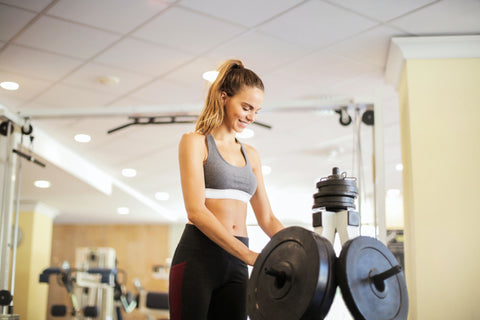

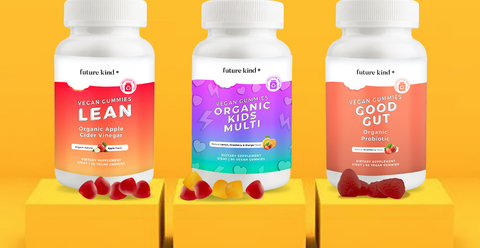
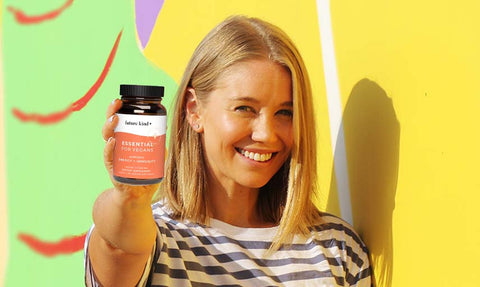
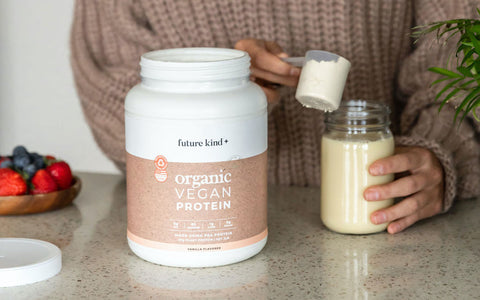
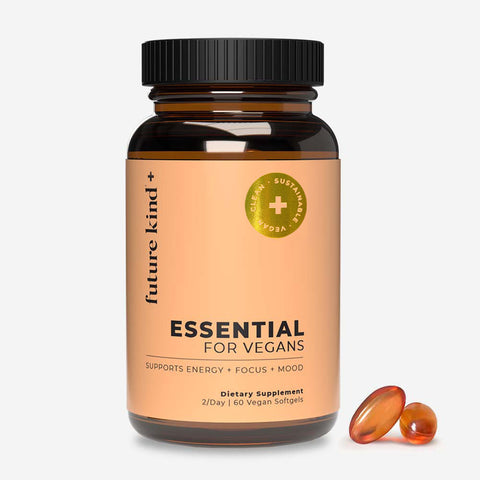
Comments (0)
There are no comments for this article. Be the first one to leave a message!